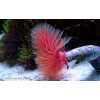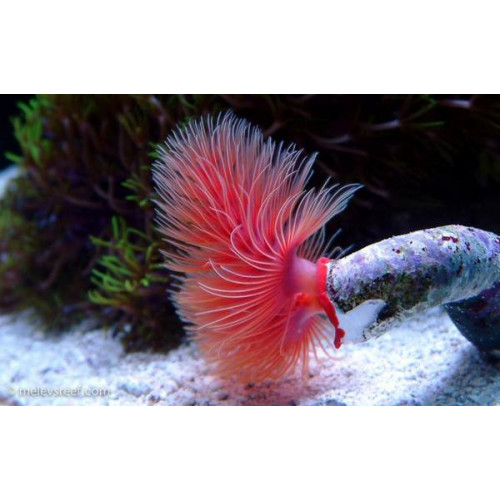Species Name : Protula Bispiralis
Care Level : Expert Only
Temperament : Peaceful
Color : Pink
Diet : Filter Feeder
Reef Compatible : Yes
Water Conditions : 72-78° F, dKH 8-12, pH 8.1-8.4, sg 1.023-1.025
Waterflow : Low to Medium
Placement : Bottom
Max. Size : 7"
Family : Serpulidae
Origin : Indo-Pacific
Supplements : Calcium, Magnesium, Strontium, Trace Elements
Red Coco Worm (Protula Bispiralis), also known as the Hard Tube Feather Duster, or Hard Tubeworm, has a crown that can be white, yellow, orange, pink, or red. The radioles may be banded or patterned. Younger Hard Tube Coco Worms have bi-lobed crowns, while the crowns of older individuals are spiraled.
The Red Coco Worm secretes a calcareous tube, approximately 1/2 inch in diameter and 5-8 inches long, to house its vulnerable worm body. When disturbed, it can quickly retract its crown and close its operculum to shut the top of its tube. It usually anchors its tube in a crevice of the rocky reef or in the gravel along current-swept reef slopes. It uses the radioles to filter out floating plankton.
The aquarium for the Red Coco Worm should be well-established and contain a rock and gravel substrate. The tube housing the worm should be buried in the sediment. Specimens are better placed near the bottom of the aquarium in shaded areas where gentle to moderate currents will help bring various foodstuffs. Lower areas that often produce current-swept detritus, a foodstuff that helps provide some nutrition.
Tankmates that will pick on or eat tubeworms, e.g., triggerfish, angelfish, pufferfish, butterflyfish, crabs, peppermint shrimp, etc., should not be housed with this type of creature. They are safe with corals and other invertebrates. When properly fed, these are hardy and long-lived vertebrates.
The Red Coco Worm requires calcium and the proper alkalinity to grow. It is extremely intolerant of poor water quality and copper-based medications.
Frequent feedings, at least every-other day, with fresh or preserved phytoplankton additives are a must for long-term survival. Keep in mind these additives cannot be dispensed directly onto its gills, as the worm will quickly retreat back into its tube. In fact, it's also highly sensitive to changes in light intensity and will usually quickly retreat when a shadow passes over it. Dispense the additive into the aquarium's current and allow it to bring the foodstuff to the worm.
Size: 2-1/2" to 4"
-
There are no reviews for this product.
-
No questions yet
Tags: Inverts



-500x500.jpg)
-100x100.jpg)